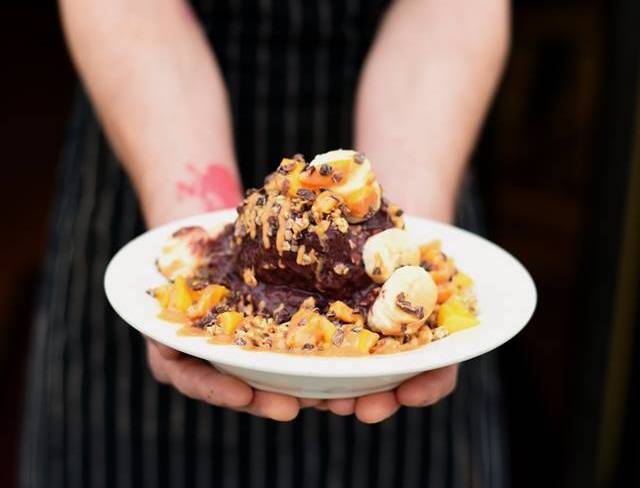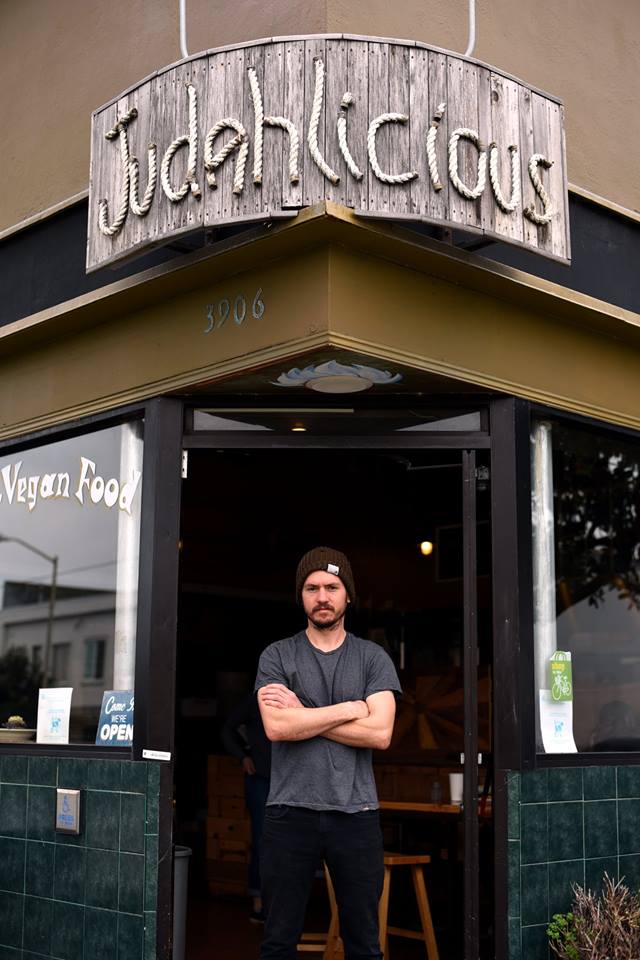Swapping out bacon, burgers, and cheese for other sources of protein like tofu and nuts tends to raise a few eyebrows.
Several SF State students who have adopted a vegan lifestyle have dealt with the uncomfortable conversations when explaining their choice to change their diet.
Senior Maycee Pogue, an environmental studies major, lives in an all-vegan household and has been vegan for nearly three years. She transitioned from a vegetarian lifestyle.
“The purpose of me going vegan was definitely a moral thing,” Pogue said. “There are so many other benefits that come along with it…there are environmental implications to eating animal products.”
According to an Environmental Working Group’s article, global meat production has tripled to about 600 billion pounds from 1971 to 2010, while world population grew just by 81 percent. It claimed that, at that speed, it will only continue to rise.
“At this rate, production will double by 2050 to approximately 1.2 trillion pounds of meat per year, requiring more water, land, fuel, pesticides and fertilizer and causing significant damage to the planet and global health.”
Pogue said being vegan results in a lot of ridicule and judgement because of how important and essential food is to people. She believes veganism forces people to examine their lifestyle, which leads to a lot of uneasy conversations.
“Food is so deeply ingrained us. You’re eating animals before you even decide you want to eat animals,” she said. “To switch that up makes it so difficult and uncomfortable for people.”
While vegetarians avoid meat, poultry and seafood, vegans take this lifestyle one step further by steering clear of all animal products entirely.
“It’s so much more than what we eat,” Pogue said. “It’s what we wear…the cosmetics that we choose.”
Like Pogue, SF State creative writing graduate Mike Petitte was a vegetarian first but has been vegan for the past 8 years.
Petitte is the manager of an Outer Sunset vegan restaurant called Judahlicious. Petitte enjoys serving food to people who are not on a plant-based lifestyle and seeing their reactions to the food his restaurant whips up.
(Map made by Gabriela Cazares-Lopez)
“A lot of people come into our shop who are not vegetarian or vegan and they are like ‘I eat meat but this is one of the best things I’ve ever had.’
Petitte continued, “It’s great to hear. When you hear something like that, you’re like that’s why I’m doing this.”
Many perceive plant-based diets as being costly, but study shows that swapping out meat products that are usually more pricey for vegan substitutes can actually potentially make it cheaper. According to an economical health diet study, people who are on a plant based diet can save $740 a year more than a person on a meat-based diet. Although it can be more costly to purchase replacement meats, according to 19-year-old vegan and SF state student, Casey Loosebrock.
“The fake meat is a little bit more expensive than the real meat, but I feel like it’s very comparable to eating a non-vegan diet, financially.”
Best friends and SF State students, Linden Carty and Angelique Wilcox, who are also on a vegan diet, heed the importance of knowing what they’re consuming and the repercussions it has.
Wilcox became vegan three years ago in hopes of getting clearer skin, and ended up becoming more conscious of a consumer as a result.
“Being vegan has made me look at what is in my food, like looking at the ingredients to make sure it’s vegan,” Wilcox said. “Even if it’s not vegan, I still want to find out what it is. It has also made me more compassionate and caring of other creatures.”
21-year-old junior Linden Carty decided to adopt a vegan lifestyle after Wilcox convinced her to two years ago.
“Being vegan has led me into the type of person I want to be, I’ve never really knew that much about animal welfare, sustainability or environmental causes, but now I’m very passionate about those things,” Carty said “Physically, I feel super healthy and I hate working out, so being vegan has helped me with that.”
Switching to a vegan diet can lead to benefits such as losing weight, lower cancer risk, lower mortality rates, a healthier heart according to an article titled “Vegan diet: health benefits, risk and meal tips.”
SF State’s Registered Dietitian Nutritionist Lauren Muckley warns students to not forget to make up the nutrients when they switch to a plant-based diet.
“The main important thing to think about is when you are going on a plant-based diet, you can’t just stop eating certain foods that are animal-based,” said Muckley. “You really need to make sure you are consuming certain nutrients that those foods are providing, and making sure you are making up for them in different ways.”
Muckley also explained what can happen if students do not meet their nutrient needs while on a plant-based diet.
“The negative things that can happen if you are leaving out the animal products but still having a lot of junk food, it can lead to deficiencies,” she said. “Students can become deficient in calcium, B12, as well as iron. If they’re low in iron, they are usually fatigued and it’s really hard to concentrate on homework.”
B12 is a common deficiency for vegans because they are primarily found in meat-based products. Vegans can consume B12 in other ways such as taking a supplement or from some foods.
According to an article that provides essential information on B12 in one’s diet, “some soy and rice beverages as well as soy based meat substitutes are fortified with vitamin B12.”
Loosebrock believes the hardest part is not finding other ways to find substitutes for B12, or even giving up steak and cheeseburgers. She thinks the most difficult part is explaining to people why she chose to change her diet.
“I don’t think being vegan is hard, it’s just inconvenient to others. You have to hear, ‘but bacon’ so many times.”








